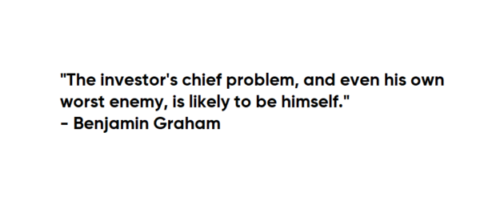If I were to describe my investing philosophy in one sentence I’d call it “discipline based investing”. In short, the strategy you can remain disciplined to is superior to any strategy you can’t remain disciplined to.  So I was excited to confirm my priors when Bill Bernstein captured this sentiment in a recent podcast:
So I was excited to confirm my priors when Bill Bernstein captured this sentiment in a recent podcast:
“The other question is to what is the risk of stocks? Again, to me that’s a stupid question without qualifying in terms of the life cycle of the investor. If you are a 20-year-old person with a lot of human capital or a 25-year-old person with a lot of human capital and no investment capital, then stocks are not risky at all. In fact, if you’re a young saver, you should get down on your knees and pray for horrible stock market returns and horrible stock market volatility so you can acquire your shares very cheaply for when you are much older.
Now, at the opposite side of that spectrum, at the opposite end of the spectrum is somebody like me for whom stocks are Three Mile Island toxic because if I’m burning 5% of my portfolio and I get a 10-year total return with minus 50%, my money is pretty much all gone. And the market may turn around with the vengeance after 10 years but by then it’s too late for me because most of my money is, if not almost all of my money, is gone. Circling back to the young person, you might say, well the young person should invest 100% in stocks. In other words, put 100% of their money every single pay period into the stock market and that is theoretically correct. The only problem is there are very few sentient beings in this quadrant of the galaxy that can tolerate 100% stocks. It’s suboptimal if you’re a young person to invest in a lot of bonds but a suboptimal strategy that you can execute is better than an optimal strategy you can’t execute.”
This can’t be repeated enough:
“a suboptimal strategy that you can execute is better than an optimal strategy you can’t execute.”
Most investors spend their investment lives searching for the best returns instead of targeting an appropriate type of return. And in the process they end up wasting money on taxes and fees chasing strategies that very likely end up underperforming anyhow (since most alpha chasers do).
But what is the key to sticking with an appropriate strategy as opposed to constantly chasing your tail looking for the optimal strategy? It’s behavioral alpha or the excess return that an investor earns by being well behaved. As Bernstein said, the suboptimal strategy that you remain loyal to is likely to beat the optimal strategy that you cheat on. But how do we capture behavioral alpha?
Behavioral alpha can be maximized in the following ways:
- The suboptimal portfolio you can stick with is better than the optimal portfolio you can’t stick with. Targeting the appropriate portfolio instead of the optimal portfolio.
- Alpha isn’t part of a good financial plan. Understanding the alpha paradox and ditching Wall Street’s sales pitch that sells the hope of market beating returns in exchange for the guarantee of higher fees.
- Having realistic investment expectations.
- Start with a planning based foundation. Building reasonable financial goals across realistic time horizons.
- Customize, customize, customize. Establishing a personalized understanding of your risk profile.
- As John Bogle always said, “stay the course”.
Warren Buffett said, “investing is simple but not easy”. And failing to remain well behaved is the primary factor that makes it so difficult for most of us.
Mr. Roche is the Founder and Chief Investment Officer of Discipline Funds.Discipline Funds is a low fee financial advisory firm with a focus on helping people be more disciplined with their finances.
He is also the author of Pragmatic Capitalism: What Every Investor Needs to Understand About Money and Finance, Understanding the Modern Monetary System and Understanding Modern Portfolio Construction.

